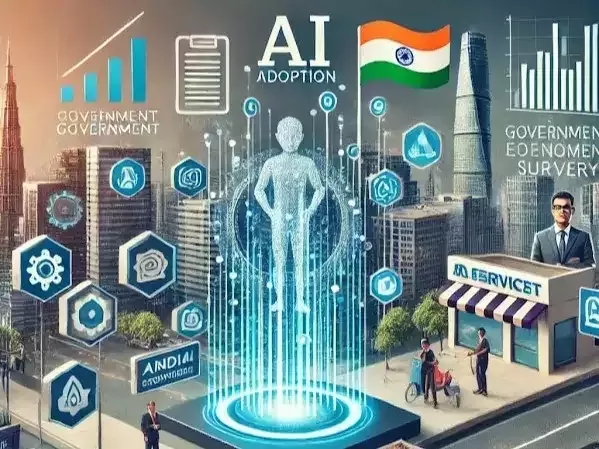India’s Economic Survey 2025: Navigating the Challenges and Opportunities of AI
As Artificial Intelligence (AI) continues to disrupt global markets, India is strategically poised to harness its potential. The Economic Survey 2025, presented by Finance Minister Nirmala Sitharaman, highlights both the promises and challenges AI presents. With key recommendations for the future, India is urged to focus on education, workforce skilling, and inclusive policies to fully capitalize on AI’s benefits, while minimizing its disruptions.

In the rapidly evolving global landscape, Artificial Intelligence (AI) has emerged as a transformative force, disrupting industries and economies across the world. As major players like China continue to make significant strides in AI, India is keenly observing the developments. The Economic Survey 2025, tabled by Finance Minister Nirmala Sitharaman on January 31st, provides a comprehensive analysis of AI's potential in India, emphasizing the need for targeted investments, education reforms, and collaborative efforts to mitigate risks while maximizing benefits.
The Demographic Advantage: India’s Position in the AI Era
India, with its young and dynamic workforce, is well-positioned to benefit from the rapid advancements in AI. The survey highlights that the country’s demographic advantage—combined with its diverse economic landscape—makes it a prime candidate to lead in AI adoption and development. However, tapping into this potential will require a structured approach and strategic investments in education, infrastructure, and policy.
The document stresses that, while India’s diversity offers ample opportunities, challenges such as infrastructure deficits, resource inefficiencies, and the experimental nature of AI must be addressed for large-scale AI adoption. Despite these hurdles, the survey suggests that India’s ability to adapt and leverage AI technologies lies in the proactive efforts of its government, private sector, and academic institutions.
Overcoming Barriers to AI Adoption
According to the survey, significant barriers persist in AI adoption. These include concerns over the reliability of AI technologies, limited access to advanced infrastructure, and the risk of inequality in the distribution of AI's benefits. To overcome these challenges, India must ensure that AI is integrated into the country’s development plans with a focus on inclusivity and sustainability.
The survey calls for a holistic approach to addressing AI’s implications. This involves establishing robust policy frameworks to guide AI development, ensuring that both public and private sectors play an active role in creating an ecosystem conducive to AI innovation. Furthermore, it emphasizes that India should take advantage of AI’s early developmental phase to establish regulations that prevent job losses and facilitate a smoother transition for workers who may be displaced by automation.
The Importance of Education and Workforce Skilling
One of the key aspects highlighted in the Economic Survey 2025 is the need for significant investment in education and workforce skilling. AI will undoubtedly change the nature of work, and India must be ready to equip its workforce with the necessary skills to thrive in an increasingly automated world.
India’s services-led economy is especially vulnerable to AI disruptions, as many white-collar jobs are at risk of being automated. An IAM Ahmedabad survey cited in the Economic Survey found that 68% of white-collar employees in India expect their jobs to be partially or fully automated within the next five years. The International Labour Organization (ILO) estimates that 75 million jobs globally could be at risk due to AI automation. These figures underline the urgency of preparing India’s workforce for the future.
The survey calls for a coordinated effort between the government, the private sector, and academia to provide workers with the necessary tools and training to adapt to these changes. In addition, it stresses the importance of creating enabling institutions that can support this workforce transformation, ensuring that workers have access to safety nets and opportunities for reskilling.
AI as a Catalyst for Equitable Economic Transformation
Despite concerns about job losses, the survey posits that AI can serve as a catalyst for equitable economic transformation. It argues that with the right policies and strategic planning, AI could contribute to reducing inequalities and driving growth in sectors like education, healthcare, and manufacturing.
Corporate responsibility is another crucial aspect outlined in the survey. It calls on businesses to display a high degree of social responsibility, ensuring that AI’s benefits are widely shared and that the technology is used to enhance societal welfare rather than exacerbate inequalities. The survey advocates for AI to be seen not as a crisis, but as an opportunity to transform economies in a more inclusive and sustainable manner.
Challenges of AI in India’s Services-Led Economy
India’s economic landscape is dominated by its services sector, particularly in fields like information technology (IT), business process outsourcing (BPO), and financial services. These industries are particularly susceptible to the impact of AI-driven automation. The survey notes that anxieties around the effects of AI on employment are high in India, given that many of the country’s white-collar jobs could soon be replaced by machines.
While AI promises increased efficiency and productivity, its potential to disrupt the services sector poses significant challenges for India’s labor market. The survey underscores that large-scale labor market disruptions due to AI could materialize in the near term unless proactive measures are taken to manage the transition.
Global Perspective: AI’s Impact on Labor Markets
The survey also draws attention to the global implications of AI, noting that many countries are grappling with similar concerns about job displacement and labor market disruption. The ILO’s estimates on job losses due to AI automation are a stark reminder of the need for coordinated global action to address the challenges posed by AI.
At the same time, the survey highlights that AI also presents opportunities for creating new industries and sectors. In India, sectors like AI research, data analytics, and machine learning could see significant growth, creating new job opportunities and driving economic progress. The key, however, lies in the country’s ability to balance AI’s disruptive effects with its potential for inclusive growth.
The Road Ahead: Policy Recommendations
The Economic Survey 2025 provides several key recommendations for India to harness the power of AI:
- Investment in Education and Skilling: To prepare the workforce for an AI-driven economy, India needs to invest in quality education and reskilling programs that equip workers with the skills needed for future jobs.
- Infrastructure Development: Addressing infrastructure deficits, particularly in technology and digital infrastructure, is crucial for the widespread adoption of AI across the country.
- Inclusive Policy Frameworks: India must create policies that ensure AI benefits are broadly distributed, particularly in rural areas and among marginalized communities, to prevent increasing inequalities.
- Collaboration Between Stakeholders: A joint effort from the government, the private sector, and academic institutions will be essential to shaping India’s AI future and ensuring a sustainable transition for workers.
Conclusion: Navigating the AI Revolution
As AI continues to reshape global labor markets, India finds itself at a critical juncture. The Economic Survey 2025 provides a roadmap for how the country can navigate the challenges and opportunities posed by AI. By investing in education, fostering collaboration, and ensuring inclusivity in AI development, India can position itself to thrive in an increasingly automated world.
However, the transition will not be without its challenges. Addressing the social and economic implications of AI will require proactive planning and a commitment to ensuring that the benefits of AI are shared by all segments of society. The stakes are high, and the coming years will determine whether India can leverage its demographic advantage and economic diversity to emerge as a leader in the AI revolution.
What's Your Reaction?

















